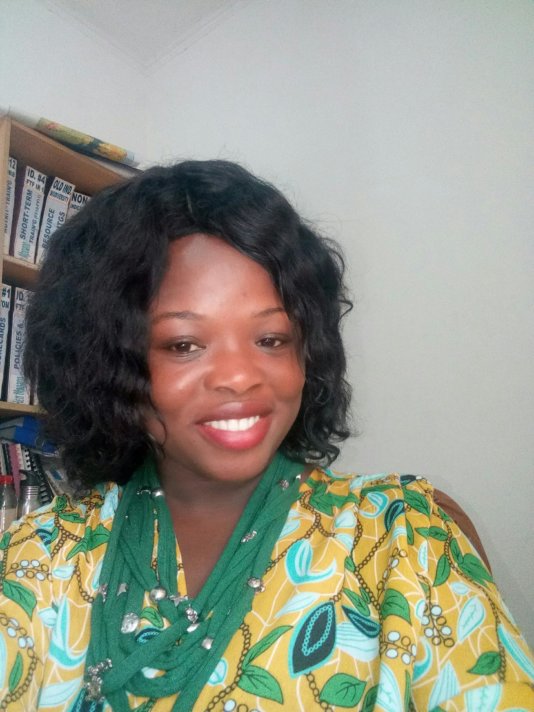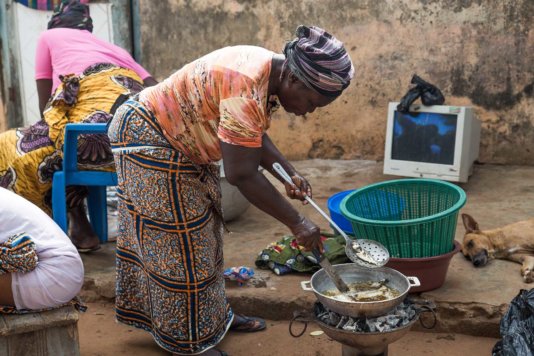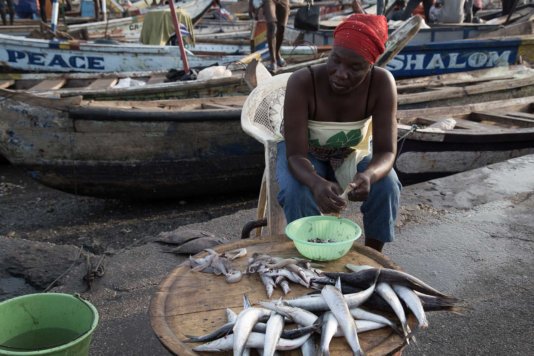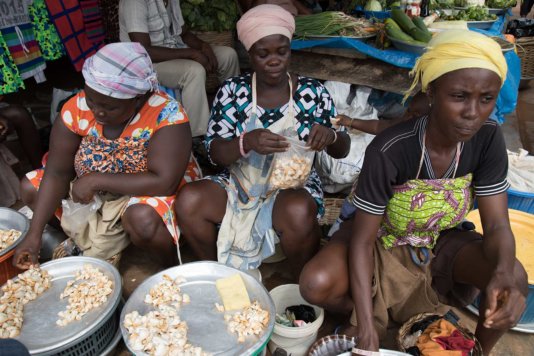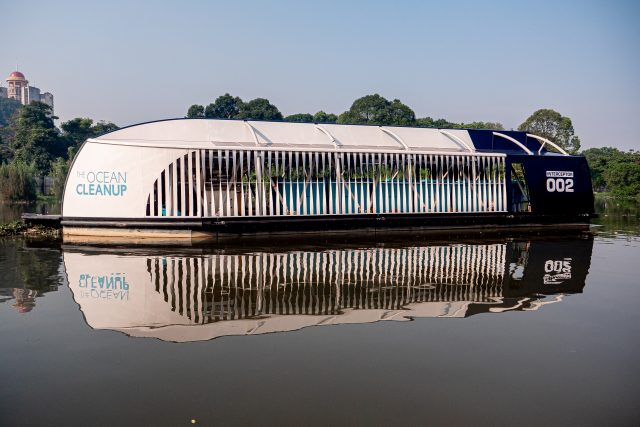- About
- Topics
- Picks
- Audio
- Story
- In-Depth
- Opinion
- News
- Donate
- Signup for our newsletterOur Editors' Best Picks.Send
Read, Debate: Engage.
| March 07, 2019 | |
|---|---|
| topic: | Women's rights |
| tags: | #fishmongers, #Ghana, #Environmental Justice Foundation (EJF), #NAFPTA, #Saiko |
| located: | Ghana |
| by: | Kwabena Adu Koranteng |
FairPlanet caught up with Adiza Owusu, Gender officer of Hen Mpoano, a local NGO based in the Western region of Ghana and lead author of the Gender report on Ghana’s Fisheries, to discuss the challenges confronting these women, called "the fishmongers" and the benefits being derived.
FairPlanet: Working with the fishmongers over the years, have you been able to discover something like job security on their part?
Adiza Owusu: That’s a tricky question. You know that our women in fishing are mostly fish processors and depending on what is handed to them by the fishermen. There is a huge decline in the fisheries sector, especially for the artisanal fish. So, the fishmongers sometimes return home with empty pans. Even when they are able to get some fish, it’s often of low quality due to process those fish are harvested. Nowadays, the fishermen use poisonous chemicals and illegal means to harvest the fish, which really affects the end product. So in terms of job security, women in fishing are not really secured, because the sector can collapse at any time, due to illegal activities.
Why are women not getting quality fish?
Because of the illegal fishing activities that the fishermen are engaged in. This includes light fishing, that’s fishing with light in the sea at night and dynamite fishing. The fish normally go into the mangroves to breed and reproduce. Interestingly, the fishmongers in the communities surrounding the sea and the rivers joining the sea also depend on the mangroves for smoking their fish. When they cut the mangroves they don’t replant. So the fish don't have a place to breed. This is also contributing to the decline in fish stock and a whole lot of factors.
There have been policies and programs implemented to support the fishmongers. Successfully in your opinion?
Initially, the fishmongers were not well organised. Nevertheless, the former Minister of Fisheries, Sherry Aryitey, managed to organise them into a group called the National Association of Fish Processors and Traders (NAFPTA) to serve as the mouthpiece for women in the sector and fight against illegal fishing. When you go into the Fisheries Act, it’s mostly on the extractive sector. The Act operates around issues like fishing gears, boats and nets. Interestingly, there are not clear cut policies governing, how women are supposed to process fish or the kind of technology that should be used. However, due to the recent project by the Environmental Justice Foundation (EJF), we have initiated changes into the review of the Fisheries Act. We are advocating that when the Fisheries Act and other policies are being reviewed there should be a section that will talk about women in fish smoking and processing, the type and method of processing and smoking technology and even the type of fish that should be smoked or processed. The current minister has been meeting some of the women to know their concerns and the way forward. There is definitely a need for a pragmatic policy that will govern the activities of the fishmongers.
How would the future of the fishmongers look without clear cut policies governing their activities?
There is a future, if only they are willing and ready to work together. Their associations are not strong enough, although they should be and become the mouthpiece of all women. Only then can they strongly advocate for good policies and practices in the fisheries sector. When they come together and advocate for good fishing practices, which some of them have started already, it will help. Another obstacle is that many of them are not getting the backing of the fishermen. Some are married to fishermen and don’t come out boldly to condemn their illegal activities for fear of intimidation and victimisation. Despite all these, I think there is a future for them.
Apart from the challenges mentioned, are there success stories other fishmongers can boast of?
Absolutely. The workload on the fishmongers was previously too heavy. They would go to the beach to get fish, come home and process while taking care of their children and their husbands. Now, there are processes that enable them to lessen the burden. Based on this, they are efficient now. In the past, most of them were using the “chorkor smoker” - that’s a traditionally, poor method of smoking fish - but now things changed and a new, more effective technology for smoking fish was introduced. Those, who have adopted the new technology are able to smoke high-quality fish and get higher prices than those that are not using it.
Another positive change for the communities we operate in, was building up the capacity of the women to be part of decision-making processes that affect their livelihoods. For instance, if a fisherman brings illegally caught fish, those fishmongers have been trained to detect, reject and condemn it. And they will as they have come to realise the effect of illegal fishing on their livelihoods and their future. So they are doing well to reverse these acts.
Currently, we have some women groups who are trying to get more women on board to be trained as part of the management decision making. Initially, they were very reluctant and scared of their husbands and speak in public. But now they came aware that their children and livelihoods depend on them. Now some of them come out boldly to advocate for the use of better fishing methods.
Do fishmongers have access to financing and what role plays your organisation in this regard?
As discussed, many of the fishmongers are not well organised. When they go to the banks to get a loan they are often subject to all kinds of humiliation. The banks want to know that at the end of the day an applicant will be able to pay back. But when you form and operate a strong group, you have a completely different standing against the banks.
We are training and organising the fishmongers into strong groups. Therefore, we have established the Village Business Savings and Loans (VBSL) to support them. A group of 15 or 25 fishmongers come together to contribute some amount of money every week and every month. With this collateral, they are able to access loans as a group.
Furthermore, the NAFPTA group was promised some loans but this is yet to come and we are waiting for the government to fulfil their promise. There is another project that has promised to give out loans to our groups but the money is yet to be released.
How many women participate in the projects of your organisation?
Right now there are about 500 women we are working with and supporting across the coastal regions of Ghana.
Some of the fishmongers want us to give them money aside from the training and education and we tell them that’s not how we operate. What we do is to educate, train and prepare them adequately to be able to access loans using their groups.
When it comes to education on illegal fishing, how do you train the women to detect and identify some of the poisonous fish that are caught illegally?
As part of our awareness creation and sensitisation programs, we were promised by the Ghanaian government that it would make available some of these gadgets that are used to detect such fishes, but they are yet to come and we are waiting. The detector is a machine that is able to detect whether a fish is caught with chemicals. Besides, some of the women have a way of detecting these illegally caught fishes. They feel some reactions on their palm and hands when the fish has chemicals in it. Though they don’t have the technology to detect, they sometimes know the bad ones because of some of the reactions they get.
How serious is the act of illegal, unregulated and unreported fishing in Ghana?
The IUU fishing activities are very bad in Ghana. It’s one of the major causes of decline in fishing. One of the methods the fishermen use is the 'saiko fishing'. In this process, when the heavy fishing trawlers harvest the by-catch - that’s the fish they don’t need – they don’t report it to the authorities at the landing harbour. Instead, they sell it to the saiko traders, who often meet the trawlers at sea to purchase the by-catch. They go to sea without net with the aim of buying only the by-catch from the trawlers. It also encourages the trawlers that are supposed to harvest their fish in deep-sea waters to move to the shallow areas, where they are not permitted to harvest fish in huge quantities and sell to the saiko fishermen. Through this process, they catch and destroy even the juvenile fish.
Aside from this, light fishing, as I explained earlier, is also a problem. The fishermen place the light in the sea at night and this attracts a whole lot of different species and they harvest everything. They don’t allow the juvenile fish to grow and reproduce. Ghana’s fisheries sector has been classified as being on the verge of collapse due to the ongoing illegal activities.
What does the government do to curb illegal fishing activities?
I can’t say much about that. The government is doing its part, the institutions responsible are also doing their part, and the problem is the failure to enforce the law. Enforcement has become an issue, which must be looked at critically to save the situation.
By copying the embed code below, you agree to adhere to our republishing guidelines.
